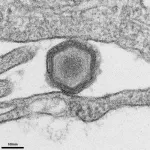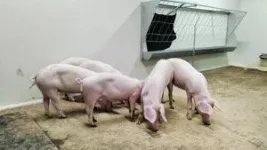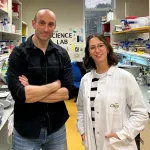(Press-News.org) Rockville, Maryland—March 26, 2024—Researchers from the J. Craig Venter Institute (JCVI), the Friedrich-Loeffler-Institut (FLI), and the International Livestock Research Institute (ILRI) have developed a reverse genetics system for African swine fever virus (ASFV). This new system will aid researchers in developing vaccines and in studying the pathogenesis and biology of ASFV, a highly contagious, deadly viral disease affecting domesticated and wild pigs, especially prevalent in Africa, Europe, Asia, and the Caribbean. A recent study estimates if ASFV reached the United States it could result in economic losses exceeding $50 billion over a ten-year period.
JCVI Professor Sanjay Vashee, Ph.D., senior author on the paper remarked, “By developing a synthetic genomics-based reverse genetics system for ASFV, we are not only advancing our understanding of this virus but also creating tools that can be applied to other emerging viral threats. This research has the potential to significantly reduce the economic losses caused by ASFV in the global swine industry, providing much-needed solutions to control and prevent the spread of the disease.”
The reverse genetic system allows scientists to quickly generate genetically modified versions of ASFV and involves several steps. First, scientists construct synthetic DNA, which is a lab-made version of the virus’s genetic material. Fragments of ASFV are modified and then assembled into full-length genomes in yeast using its recombination machinery. The modified genomes are then transferred to E. coli which makes isolating them in larger amounts possible.
The synthetic DNA is then transfected (or artificially introduced) into mammalian host cells which are subsequently infected with a self-helper virus. This self-helper virus is an inhibited version of ASFV which has been modified using CRISPR/Cas9 technology, a powerful gene-editing tool that can precisely cut DNA at specific locations. The alterations ensure that the self-helper virus cannot replicate on its own. Despite this inhibition, the self-helper virus still provides the necessary proteins and machinery required for the synthetic DNA to replicate and assemble into new virus particles.
This process results in the production of live recombinant viruses that contain the specific genetic modifications introduced in the synthetic DNA. These recombinant viruses can then be used for further study or vaccine development.
"Globally, ASF outbreaks have caused devastating economic losses amounting to billions of dollars, severely impacting the pork industry, food security, and livelihoods. In Africa, the impact could be dire given the presence of multiple genotypes of the virus and the widespread lack of adequate biosecurity measures to control the disease,” said Dr. Hussein Abkallo, a researcher at ILRI and one of the authors of the paper. “This platform gives hope of developing new, targeted vaccines that can protect animal health to reduce mortality as well as the environmental footprint of the livestock sector by preventing unnecessary losses."
The synthetic genomics-based reverse genetics system developed for ASFV can be applied to other viruses with non-infectious genomes, offering significant potential for research and vaccine development. For example, it could be applied to lumpy skin disease virus, a double-stranded DNA virus that primarily affects cattle causing significant economic harm.
This methodology could also be adapted for emerging RNA viruses such as Zika, chikungunya, Mayaro, and Ebola viruses, which have caused significant outbreaks and pose serious threats to global health. By leveraging synthetic genomics, researchers can rapidly develop reverse genetics tools for these and new emerging viruses, facilitating the study of their biology and the creation of effective vaccines and treatments.
In addition to Dr. Vashee, the study team included senior author Lucilla Steinaa, Ph.D. (ILRI) and first authors Walter Fuchs, Dr. rer. nat. (FLI) and Nacyra Assad-Garcia (JCVI). The complete study, “A synthetic genomics-based African swine fever virus engineering platform,” may be found in the journal Science Advances. Funding for this work was provided by the International Development Research Centre (IDRC) Livestock Vaccine Innovation Fund (LVIF), phase I 108514 and phase II 109212.
About J. Craig Venter Institute
The J. Craig Venter Institute (JCVI) is a not-for-profit research institute in Rockville, Maryland and La Jolla, California dedicated to the advancement of the science of genomics; the understanding of its implications for society; and communication of those results to the scientific community, the public, and policymakers. Founded by J. Craig Venter, Ph.D., JCVI is home to approximately 120 scientists and staff with expertise in human and evolutionary biology, genetics, bioinformatics/informatics, information technology, high-throughput DNA sequencing, genomic and environmental policy research, and public education in science and science policy. JCVI is a 501(c)(3) organization. For additional information, please visit www.jcvi.org.
Media Contact
Matthew LaPointe, mlapointe@jcvi.org, 301-795-7918
About ILRI
The International Livestock Research Institute (ILRI) is a non-profit institution working with partners worldwide to enhance the roles that livestock play in food security and poverty alleviation, principally in Africa and Asia. ILRI’s mission is to improve food and nutritional security and to reduce poverty in developing countries through research for efficient, safe and sustainable use of livestock—ensuring better lives and planet through livestock. www.ilri.org
END
Researchers design tools to develop vaccines more efficiently for African swine fever virus (ASFV)
The reverse-genetics system developed for ASFV may be adapted for other viruses, including lumpy skin disease, Zika, chikungunya, and Ebola viruses
2025-03-26
ELSE PRESS RELEASES FROM THIS DATE:
How survivors spanned the globe after Earth’s biggest mass extinction
2025-03-26
Scientists don’t call it the “Great Dying” for nothing. About 252 million years ago, upward of 80% of all marine species vanished during the end-Permian mass extinction – the most extreme event of its kind in Earth’s history.
What followed was a mysterious, multimillion-year span that could be called the “Great Dulling,” when marine animal communities looked remarkably alike all over the planet, from the equator to the poles. Researchers have long sought an explanation for this so-called taxonomic homogenization – a scene that played out after other mass extinctions over the past ...
Even in egalitarian Sweden, a "culture of silence" may prevent university staff and students from reporting sexual harassment
2025-03-26
Even in egalitarian Sweden, a "culture of silence" may prevent university staff and students from reporting sexual harassment, with just an 8.1% reporting rate for students who had experienced either rape or attempted rape.
####
Article URL: https://plos.io/4bW0elh
Article title: What determines the ‘culture of silence’? Disclosing and reporting sexual harassment among university employees and students at a large Swedish public university
Author countries: Sweden
Funding: This work was funded by the Swedish Research Council, ...
Data from the Healthy Minds Study of 140 college campuses in the US suggests that religiousness may be protective against symptoms of depression in students, although less so in sexual minorities
2025-03-26
Data from the Healthy Minds Study of 140 college campuses in the US suggests that religiousness may be protective against symptoms of depression in students, although less so in sexual minorities.
####
Article URL: https://plos.io/3XwiyM6
Article Title: Religiousness, sexual orientation, and depression among emerging adults in U.S. higher education: Findings from the Healthy Minds Study
Author Countries: Spain, United Kingdom, United States
Funding: The authors received no specific funding for this work. END ...
Idaho National Laboratory seeks sponsor for innovation incubator to support technology commercialization
2025-03-26
(IDAHO FALLS, Idaho) – The Idaho National Laboratory (INL) is seeking an industry sponsor to invest $5 million to $10 million in a privately funded innovation incubator. This program will combine the power of a national laboratory with private sector commercialization knowledge to unleash breakthrough innovations by finding and supporting promising startups in the areas of nuclear energy, integrated energy systems, cybersecurity and advanced materials.
The innovation incubator seeks to provide seed-stage startups aligned ...
Ochsner Health celebrates team members recognized as Louisiana State Nurses Association 40 Under 40 honorees
2025-03-26
NEW ORLEANS – Four outstanding Ochsner Health nurses have been named to the Louisiana State Nurses Association’s (LSNA) second annual 40 Under 40 list.
The LSNA 40 Under 40 list celebrates 40 future leaders of nursing in Louisiana who are 40 years of age and under, exemplify dedication to the nursing profession, and demonstrate exceptional leadership qualities.
“We are immensely proud of our Ochsner honorees. This recognition celebrates our nurses who fuel their purpose each day and use their voice to influence the growth of the nursing profession and how we deliver high-quality care to our patients and communities,” said Tiffany Murdock, senior ...
Study explores how time-restricted eating affects weight loss
2025-03-26
Time-restricted eating is the latest craze for people looking to lose weight, but whether it works is still the calorie-burning question.
A new study from the University of Mississippi shows that when healthy adults pair an eight-hour eating window with regular exercise, they lose more fat – without sacrificing lean muscle – compared to exercise alone, according to a study released in the International Journal of Obesity, which is published by the Nature Publishing Group.
“We saw that this did lead to more fat loss and reduced body fat percentage over time when healthy adults were following both exercise with time-restricting ...
Ochsner Health named 2025 Gallup Exceptional Workplace Award winner
2025-03-26
NEW ORLEANS – Ochsner Health, Louisiana’s largest non-profit, academic, multi-specialty, healthcare delivery system, has been awarded the 2025 Gallup Exceptional Workplace Award (GEWA) for employee engagement. This award recognizes the most engaged companies in the world and highlights Ochsner’s continued dedication to setting a standard of excellence in patient care and the workplace.
"Ochsner Health is honored to receive this recognition," said Pete November, chief executive officer, Ochsner Health. "Our commitment to fostering a supportive and dynamic workplace for our team members is directly ...
Researchers have discovered a new mechanism for rapid liver regeneration triggered by glutamate
2025-03-26
Research conducted by the National Cancer Research Centre (CNIO), published today in ‘Nature’, reveals a mechanism in mice that is triggered just minutes after acute liver damage occurs.
This finding opens up avenues for future treatments of serious liver damage to include a diet enriched with the amino acid glutamate.
Glutamate supplementation can promote liver regeneration and benefit patients in recovery following hepatectomy or awaiting a transplant, the authors write in ‘Nature’.
Activating liver regeneration is key to treating diseases that involve severe liver damage, which are becoming increasingly frequent and are associated ...
Scientists discover why obesity takes away the pleasure of eating
2025-03-26
The pleasure we get from eating junk food — the dopamine rush from crunching down on salty, greasy French fries and a luscious burger — is often blamed as the cause of overeating and rising obesity rates in our society.
But a new study by scientists at the University of California, Berkeley, suggests that pleasure in eating, even eating junk food, is key for maintaining a healthy weight in a society that abounds with cheap, high-fat food.
Paradoxically, anecdotal evidence suggests that people with obesity may take less pleasure in eating than those of normal weight. Brain scans of obese individuals ...
How cells respond to stress is more nuanced than previously believed
2025-03-26
CLEVELAND—The body’s cells respond to stress—toxins, mutations, starvation or other assaults—by pausing normal functions to focus on conserving energy, repairing damaged components and boosting defenses.
If the stress is manageable, cells resume normal activity; if not, they self-destruct.
Scientists have believed for decades this response happens as a linear chain of events: sensors in the cell “sound an alarm” and modify a key protein, which then changes a second protein that slows or shuts down the cell’s normal function.
But in a new study published today in the journal Nature, researchers at Case Western Reserve University have discovered a ...
LAST 30 PRESS RELEASES:
Novel camel antimicrobial peptides show promise against drug-resistant bacteria
Scientists discover why we know when to stop scratching an itch
A hidden reason inner ear cells die – and what it means for preventing hearing loss
Researchers discover how tuberculosis bacteria use a “stealth” mechanism to evade the immune system
New microscopy technique lets scientists see cells in unprecedented detail and color
Sometimes less is more: Scientists rethink how to pack medicine into tiny delivery capsules
Scientists build low-cost microscope to study living cells in zero gravity
The Biophysical Journal names Denis V. Titov the 2025 Paper of the Year-Early Career Investigator awardee
Scientists show how your body senses cold—and why menthol feels cool
Scientists deliver new molecule for getting DNA into cells
Study reveals insights about brain regions linked to OCD, informing potential treatments
Does ocean saltiness influence El Niño?
2026 Young Investigators: ONR celebrates new talent tackling warfighter challenges
Genetics help explain who gets the ‘telltale tingle’ from music, art and literature
Many Americans misunderstand medical aid in dying laws
Researchers publish landmark infectious disease study in ‘Science’
New NSF award supports innovative role-playing game approach to strengthening research security in academia
Kumar named to ACMA Emerging Leaders Program for 2026
AI language models could transform aquatic environmental risk assessment
New isotope tools reveal hidden pathways reshaping the global nitrogen cycle
Study reveals how antibiotic structure controls removal from water using biochar
Why chronic pain lasts longer in women: Immune cells offer clues
Toxic exposure creates epigenetic disease risk over 20 generations
More time spent on social media linked to steroid use intentions among boys and men
New study suggests a “kick it while it’s down” approach to cancer treatment could improve cure rates
Milken Institute, Ann Theodore Foundation launch new grant to support clinical trial for potential sarcoidosis treatment
New strategies boost effectiveness of CAR-NK therapy against cancer
Study: Adolescent cannabis use linked to doubling risk of psychotic and bipolar disorders
Invisible harms: drug-related deaths spike after hurricanes and tropical storms
Adolescent cannabis use and risk of psychotic, bipolar, depressive, and anxiety disorders
[Press-News.org] Researchers design tools to develop vaccines more efficiently for African swine fever virus (ASFV)The reverse-genetics system developed for ASFV may be adapted for other viruses, including lumpy skin disease, Zika, chikungunya, and Ebola viruses






